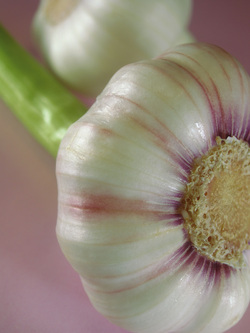|
|
 1. Garlic The key to heart health is encouraging the “good” HDL (high density lipoprotein) cholesterol and limiting the “bad” LDL (low-density lipoprotein) cholesterol. LDL itself is not so bad. It becomes dangerous when it is oxidized by free radicals inside a blood vessel. When that happens, it is attacked by the white blood cells, which become engorged and are then deposited on the arterial wall as plaque. This leads to the thickening of the arterial wall, narrowing of the passageway, and eventually blockage. HDL, on the other hand, being denser and heavier, is not likely to attach itself to the arterial wall. Instead, it actually picks up LDL, pulling it away from the blood vessel, and transporting it to the liver, where it can be broken down and excreted.
2. Ginger Ginger affect the synthesis and deployment of a group of biological response moderators called eicosanoids, which mediate healing and immunity. The body makes these important compounds from essential fatty acids and uses them to regulate critical cellular functions. Three principal categories of eicosanoids – prostaglandins, thromboxanes, and leukotrienes. Imbalances in eicosanoid synthesis and release underlie many common illnesses, from arthritis and peptic ulcer to the increased platelet aggregation that can trigger heart attacks and strokes. Ginger modulates this system in ways that reduce abnormal inflammation and clotting. 3. Sunflower Seeds: Sunflower seeds are very high in potassium and low in sodium, a balance sorely needed by most of us these days with so many salted foods available. One cup of sunflower seeds contains more than 1,300mg of potassium and only 4mg of sodium. This is helpful as a diuretic or for people who already take diuretics, to help replace some potassium. The high amount of oil in sunflower seeds as polyunsaturated fats, essential linoleic acid, and vitamin E is also helpful in reducing cholesterol levels and improving or preventing cardiovascular disease. If sunflower seeds are soaked overnight, it makes them more digestible and alkaline-forming. 4. Hawthorn: For centuries hawthorn has been used to treat heart ailments, particularly “ dropsy”, (congestive heart failure). In addition, both Asian and European practitioners have used it for centuries to treat high blood pressure and angina pectoris. European researchers have discovered that the active ingredient in hawthorn is the oligomeric procyanidins, a complex of flavonoids. This flavonoids complex helps the heart pump more efficiently by increasing blood supply to the heart muscle through vasodilatation through the coronary arteries, increasing the heart’s output of blood, and decreasing the peripheral vessel resistance, which improves blood flow. The overall result is a stronger, healthier heart with improved circulation. 5. Red Grapes and Wine: Both red wine and red grape juice may protect against heart disease in several ways. First, both of these beverages are an excellent source of phenolic compounds, including catechin, epicatechin, and gallic acid. Although red wine is a better source of phenolic compounds, they are also present in red grape juice. Phenolic compounds have been shown to prevent the formation of blood clots, which are a major cause of both heart attack and strokes in humans. Second, phenolic compounds also help to adjust the effects of nitric oxide, an important free radical produced by the body. By controlling the muscular tone of the blood vessels, nitric oxide regulates circulation and normalises blood flow, but excessive amounts of nitric oxide can be harmful. Thirdly, phenolic compounds are antioxidants which prevent oxidation of LDL cholesterol, which can lead to atherosclerosis and ultimately to a heart attack. Red wine does not lower cholesterol levels, but it does prevent LDL from turning rancid, which can lead to the formation of plaque deposits in arteries. Wine drinkers are not only less likely to get heart disease, but they appear to be less likely to get macular degeneration, a leading cause of blindness among people over sixty-five. 6. Sweet Potatoes One medium-sized baked sweet potato offers about 24,700I.U. of retinol equivalents (from beta carotene or carotenoids), or five times the RDA for vitamin A, in addition to potassium and fiber. Making them a terrific heart protecting food ! Barbara is a Health & Wellness Coach and a Nutrition Consultant. She is also the author of 'The Med Life Diet', dedicated to helping others develop healthy eating and healthy lifestyle habits and attitudes for life !
0 Comments
Leave a Reply. |
AuthorBarbara is a qualified nutritionist offering Health, Nutrition & Lifestyle Counseling. She gives Healthy weight loss advice and promotes the Mediterranean diet. She is the author of the Med Life Diet - creating healthy lifestyle habits and attitudes for life ! Archives
April 2024
|
 RSS Feed
RSS Feed
